4/1/2020
Basil Downy Mildew Field Observations
Stanton Gill
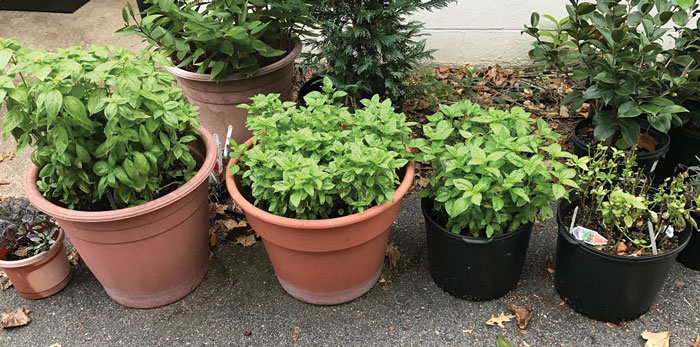
Commercially, basil is extensively grown for greenhouse and field production. High-volume retail basil sales at garden centers, roadside farm stands and farmers markets make basil a very profitable crop for many small-scale farmers. To say the least, it’s a very popular plant in residential landscapes. It looks and smells good and you can obviously harvest the foliage for culinary uses. Downy mildew on basil is a relatively new problem.
Pictured from left to right: Basil cultivars Prospera, Devotion, Obsession and Aroma on October 7, 2019.
Basil downy mildew problems in the U.S. began in Florida during the 2007 growing season. Since 2008, it’s become widespread in many states and has been reported in Canada and South America. The disease is also widespread in Europe.
Downy mildews tend to be specific to certain species of plants. Basil has its own downy mildew caused by the water mold Peronospora belbahrii. The pathogen doesn’t overwinter where freezing temperatures occur, so the timing of infection proceeds from southern states northward each summer. Although the downy mildew pathogen has been detected in basil seed, seed transmission is probably a rare event. Airborne dissemination of downy mildew sporangia or transport of infected plants is the most likely way infection spreads to new sites.
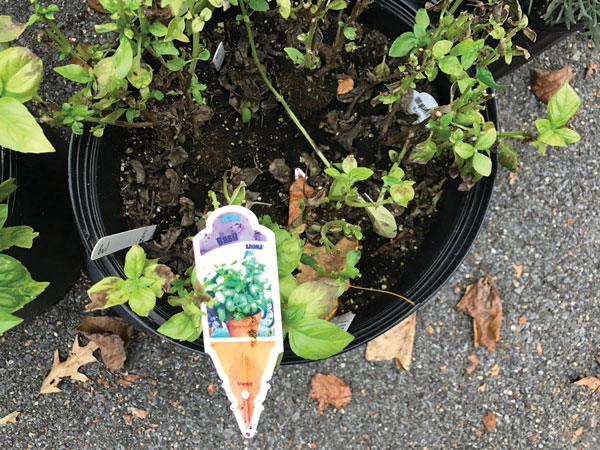 Pictured: Basil Aroma on September 3, 2019.
Pictured: Basil Aroma on September 3, 2019.
Basil leaves that become infected with downy mildew will develop a yellowish appearance, similar to a nutritional problem. Yellowing typically first appears in areas between major veins and eventually spreads across the leaf. As the disease progresses, the characteristic signs of the pathogen appear as fuzzy grayish-purple sporangia on the lower leaf surfaces. When humidity remains high, the chlorotic lesions quickly turn brown and cause plant collapse.
Resistance breeding work
Rutgers University plant breeders developed the first downy mildew-resistant cultivars—Obsession, Devotion, Passion and Thunderstruck came into limited market release in 2018. Genesis Seeds is selling the cultivar Prospera that was developed in Israel and had limited release in 2018. A more recent cultivar, Amazel, developed by Proven Winners, was released in 2019 as a resistant plant for the marketplace. Amazel is propagated from cuttings and is seed sterile, therefore continuing to produce leaves and shoots even after flower initiation.
Pi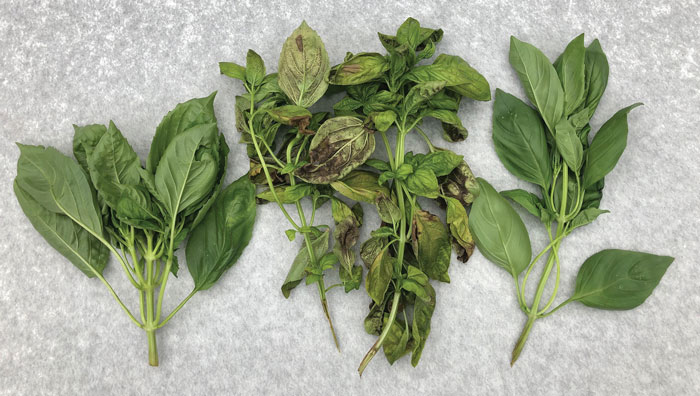 ctured from left to right, Basil cultivars: Amazel, Aroma and Prospera on August 15, 2019.
ctured from left to right, Basil cultivars: Amazel, Aroma and Prospera on August 15, 2019.
Trials in Maryland
In response to questions from Maryland growers about resistant basil cultivars and continued strong demand for basil plants, we initiated a limited field evaluation of resistant basils during the 2019 growing season. Three sites in Maryland, including the Central Maryland Research and Education Center in Westminster and Finksburg, had basil known to be susceptible to downy mildew with three cultivars that were reported to be resistant.
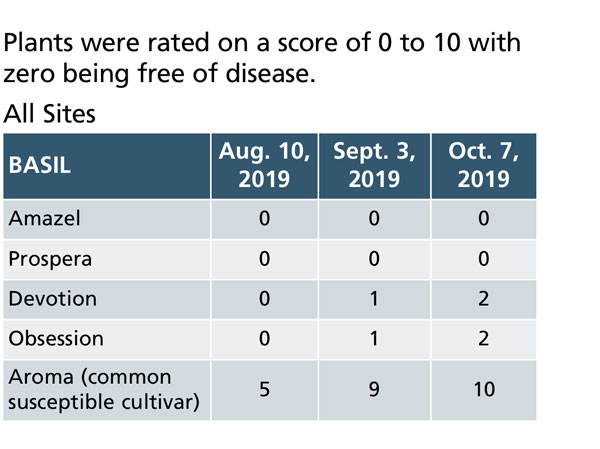 Summary
Summary
The first symptoms of downy mildew infection were noted on August 10. Symptoms on the susceptible cultivar Aroma eventually collapsed the plants by August 15. Observations of the resistant cultivars continued through October 8. Very faint sectored chlorotic symptoms on the lower leaves of Devotion and Obsession became visible by September 3 and were confirmed to be downy mildew.
In general, all the resistant basil cultivars performed quite well compared to the common susceptible cultivar Aroma. By September, the Rutgers cultivars Devotion and Obsession showed mild disease symptoms on the lower leaves, but the symptoms didn’t caused severe damage or killed the plants. The cultivars Prospera and Amazel never developed disease symptoms during the trial. GT
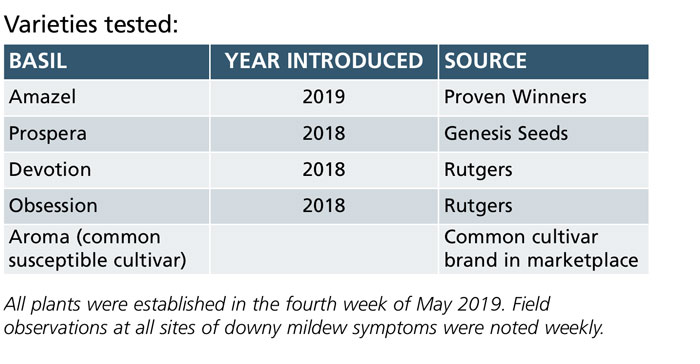
Stanton Gill is an Extension Specialist in IPM and Entomology, David Clement is an Extension Specialist in Plant Pathology, and Suzanne Klick is a Lead Technician at the University of Maryland Extension.